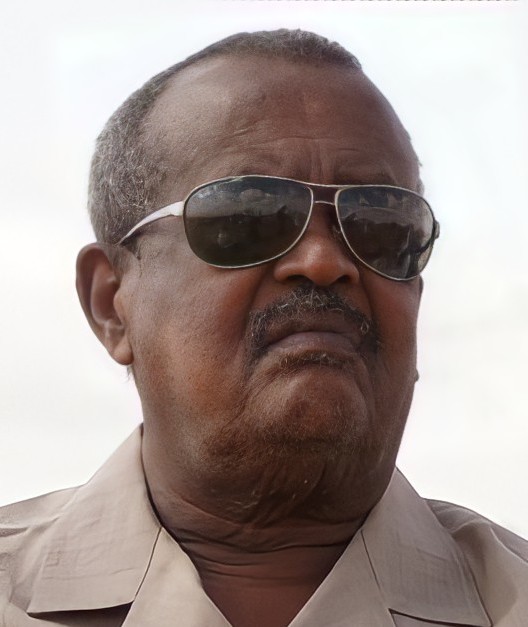A Political Journey with General Mohamud Muse Hersi Boqor: Reflections on Leadership and Legacy
Early Encounters: Radio Kulmis and the SSDF Struggle (1983)
My first encounter with the late General Mohamud Muse Hersi Boqor (Cadde Muse)—later President of Puntland State—occurred in 1983 at the studio of Radio Kulmis, the clandestine broadcaster for the Somali Salvation Democratic Front (SSDF), then operating via the shortwave antenna of the Voice of the Gospel near Maskel Square in Addis Ababa. The General visited the studio alongside Abdullahi Yusuf, then Acting Chairman of the SSDF. I vividly recall posing a bold question to Cadde Muse: “Why did you join the struggle so late?” Before he could respond, Yusuf interjected, asserting that “everyone joins the struggle when the time is right.”
Unbeknownst to me then, Cadde Muse had recently defected from his post as Military Attaché at the Somali Embassy in Ottawa, Canada. His departure coincided with the impending arrival of Somalia’s dictator, Siad Barre, for an official visit to Canada. According to diplomatic sources, Barre’s inquiry about Cadde Muse’s whereabouts reportedly embarrassed the Somali Ambassador, who had no knowledge of the General’s disappearance. Barre correctly speculated that Cadde Muse had fled to Addis Ababa—a testament to the General’s strategic timing and the regime’s unraveling intelligence apparatus.
Military Leadership and SSDF Folklore
Cadde Muse soon rose to become the SSDF’s Chief of Staff, commanding its guerrilla forces. His leadership style, however, became a subject of lighthearted anecdotes within SSDF circles. Known for his affable demeanor and distinctive Banadir dialect, he defied the stereotypical image of a stern military leader. Despite this, his commitment to the anti-Barre cause was unwavering.
After Barre’s regime collapsed in 1991, Cadde Muse returned to Canada, where he transitioned into small business ventures while remaining active in the Somali diaspora community. His political ambitions, however, were far from extinguished.
From Exile to Puntland’s Turbulent Politics
The General reemerged in Somali politics during Puntland’s formative years. In the early 2000s, he resurfaced in the Karkaar region, commanding remnants of Jama Ali Jama’s short-lived administration. After suffering defeat, he fled to Ceel-Afweyn in Somaliland-administered Sanaag, where he and his loyalists reportedly endured harsh treatment from local authorities—a reflection of the volatile clan dynamics that often overshadowed broader political alliances.
During the 2002 Somali Peace and Reconciliation Conference in Eldoret, Kenya, I received a call from Boqor Buur Madow, a respected elder from Ceerigabo. He urged me to broker dialogue between Abdullahi Yusuf and Cadde Muse. Reluctantly, Yusuf agreed to engage. The call with Cadde Muse was fraught with tension; he unleashed a torrent of grievances against Yusuf and me. Yet, this marked the beginning of an unlikely political reconciliation.
Yusuf and Cadde: An Unlikely Alliance
Post-reconciliation, Yusuf and Cadde Muse forged a close partnership, so much so that Puntland’s Vice President Mohamed Abdi Hashi once quipped, “Who is really in charge here?” Observers misunderstood their dynamic: Yusuf, eyeing Somalia’s presidency, needed Cadde’s support, while Cadde leveraged Yusuf’s influence to consolidate his own authority.
When Cadde Muse assumed Puntland’s presidency in 2005, his administration became a critical lifeline for Somalia’s nascent Transitional Federal Government (TFG). His pragmatic collaboration with federal institutions underscored Puntland’s role as a stabilizing force amid Somalia’s chaos.
The 2007 Mogadishu Agreement: A Forgotten Pact
In late 2007, during a TFG-Puntland delegation visit to Mogadishu, Cadde Muse tasked me with drafting a landmark agreement. The document stipulated that Puntland would represent federal institutions until other member states were established—a strategic move that secured $3 million of the $38 million Saudi Arabia grant to TFG for Puntland State. Signed by Yusuf, Cadde Muse, and Prime Minister Ali Mohamed Gedi, the pact remains a forgotten footnote in Somalia’s federalism saga, ignored by subsequent Puntland administrations.
A Surprising Offer and Final Reflections
During that same visit, Cadde Muse summoned me privately. After dismissing his ministers, he made an unexpected proposition: “Ismail, Eng Caydaruus can’t handle the presidency. I want you to take the job.” Stunned, I declined, advising him that “kings do not make servants of their kin.” Caydaruus, a descendant of sultans, was ill-suited for subordination. Cadde Muse later appointed Khalif Nur Ali Qonof—a decision emblematic of the delicate clan calculus underpinning Somali leadership.
Legacy of a Pragmatist
General Cadde Muse’s legacy is one of contradictions: a military defector turned diaspora businessman, a guerrilla leader mocked yet respected, and a president whose tenure bridged regional and federal ambitions. His ability to navigate Somalia’s treacherous political terrain—often through personal charisma and clan alliances—cemented his place in Puntland’s history. Yet, his story also reflects the unresolved tensions between federalism and centralized governance that continue to plague Somalia.
Though the 2007 agreement faded into obscurity, Cadde Muse’s tenure remains a testament to the complex interplay of loyalty, ambition, and survival in Somali politics—a narrative as unscripted and unpredictable as the man himself.
END
—
Ismail Haji Warsame | Warsame Digital Media (WDM) | X: @ismailwarsame


COMMENTS